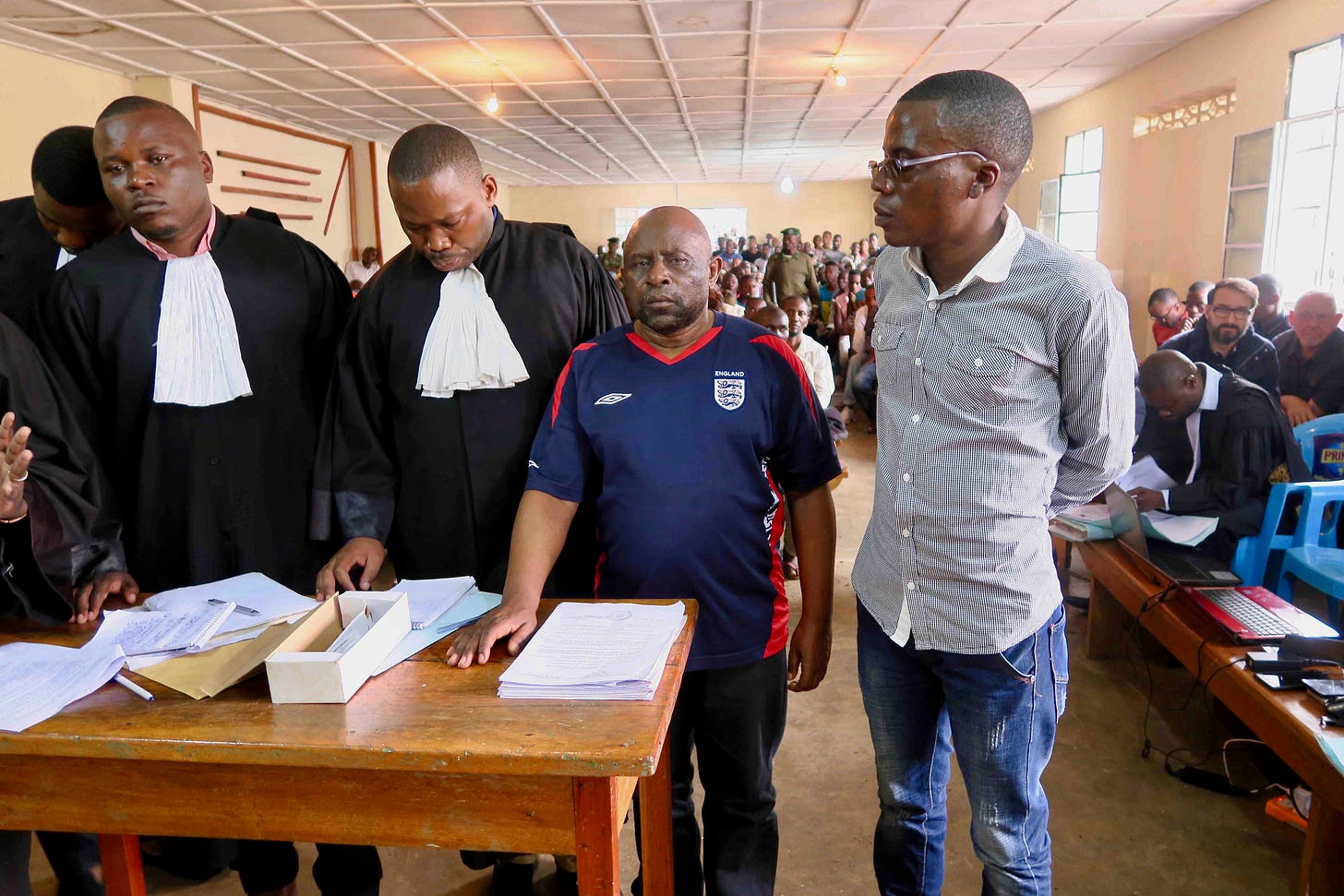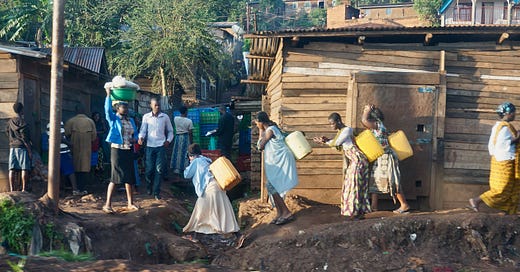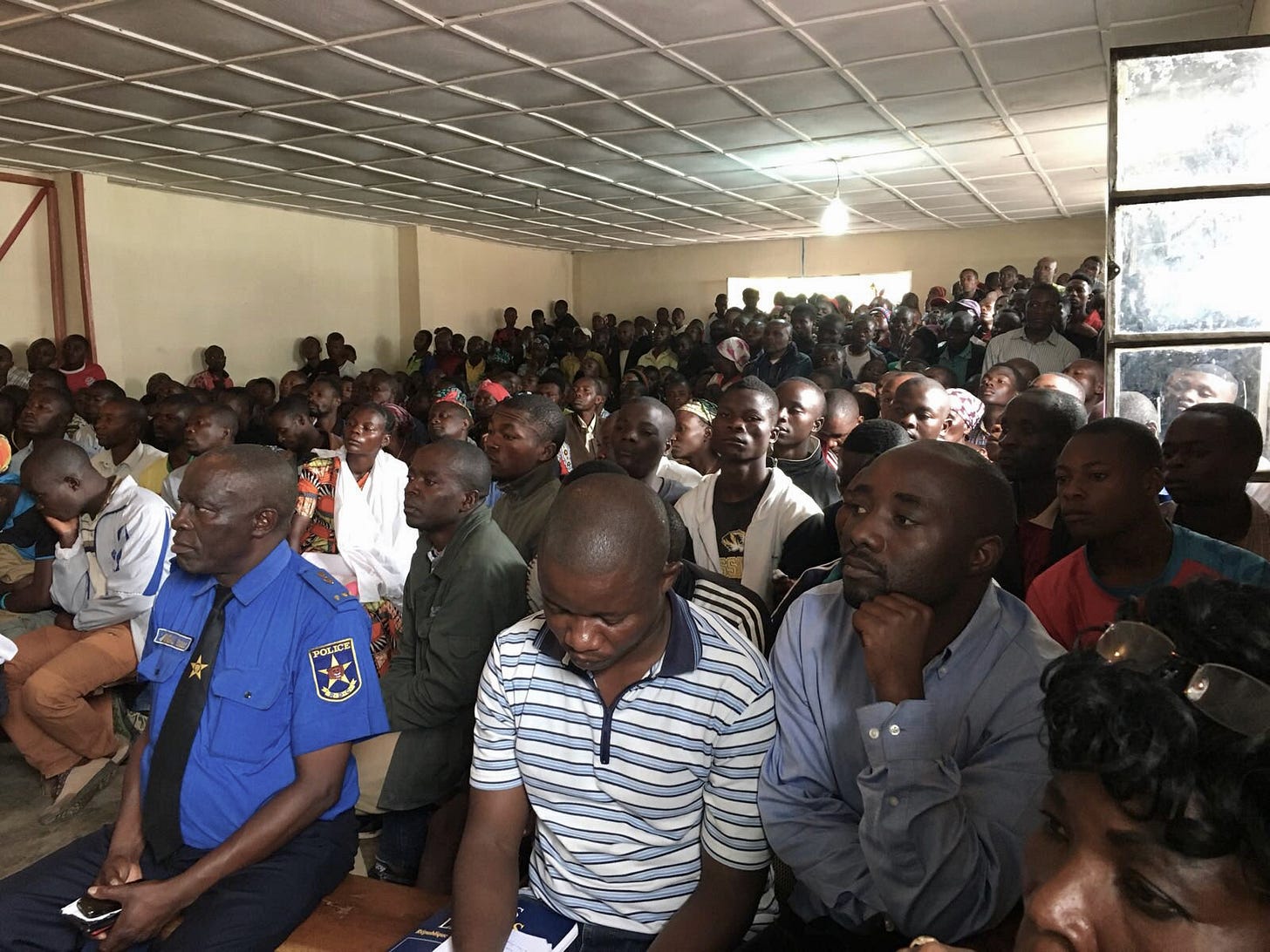How a journalist chases a monster: Theater of the absurd (Part 12)
The trial dips into madness.
Journalism is too opaque and misunderstood. Chills gives a behind-the-scenes look at how dangerous investigative journalism gets made.
In the last installment of the story of Kavumu, we left off on Day 1 of the 2017 trial for the MP who was the ringleader of the perpetrators, Batumike, and 18 of his men — including the “fetishist” who told the group they should use his witchcraft to make themselves impervious to bullets by raping virgin girls, catalyzing this whole nightmare in 2013.
When the trial adjourned for the day, Yves Kulondwa, my stringer on the ground, overheard a group of men discussing how and when they might be able to help the accused men escape prison, leaving me seriously frightened for his safety. I wasn’t there myself because I’d been told there was a good possibility I’d be killed if I went. Instead, I was sitting in New York City, anxious, and living my worst FOMO.
The danger of covering this trial was real — these men were murderers and rapists of children — but so was the insanity of that the trial itself. Overall, while intense and horrifying at times, the trial was also a comedy of errors, with constant outbursts and bizarre allegations from the defense.
I’ve decided to tell this part of the series in present tense, partly because this is how Yves wrote his notes, and partly because it puts you at the scene in a way that past tense doesn’t. (Newspapers pretty much stick to past tense. Magazine features are more flexible.)
As Poynter, a journalism institute, put it: “[The present tense], we believe, gets us closer to the goal set by the late John Gardner, novelist and writing teacher: to convey dramatic action, as in a scene, that creates a ‘vivid continuous dream’ and keeps a reader reading, especially when the story represents a narrative reconstruction of events.”
For me, the story of Kavumu has been a vivid, continuous dream told in leafy greens, soil reds, wood browns and bright, multicolored fabric since I heard about the first few rapes in 2013. If I can take you with me into that dreamlike state, in which you can see and feel what’s happening, I’ve done my job.
It is raining on Nov. 11, 2017, the second day of the trial, but Batumike’s supporters and devastated residents are already in the temporary mobile courtroom at 7:45 a.m. The damp churns up the scent of earth and mixes with an ever-present smoky smell of burning wood.
At 9:30 a.m., the proceedings finally begin in an overflowing, dim courtroom — and on an absurd note.
One by one, the defendants are called to a table of military judges to confirm their identities. A Congolese flag is draped over the desk. Yves notes that all of them — these men accused of gang-raping babies and girls — without exception, are parents of children from age 2 to 19. Most of the men are barely educated, having stopped in primary school. Batumike, their squat and angry ringleader, has a university degree.
These men stand accused of crimes against humanity, including the murder of a German botanist named Walter Müller, who owned a sprawling plantation near Kavumu. Batumike and his men killed Müller and illegally took over the land in 2012. Squatting on the plantation, Batumike formed his own makeshift militia, calling it Jeshi ya Yesu, or the Army of Jesus. Nobody knows how many militia members there really are, but rumors have circulated that there are hundreds.
Side note: Batumike is a man who would sell his own mother up the river. Or at least his brother. After Müller’s murder, the MP asked his brother to take the blame. When the brother wouldn’t, the politician told 39 of his men to say that his brother had raped their wives. The brother wound up spending 40 days in jail on this charge, but eventually the court ruled it had been a lie cooked up by Batumike.
At 11:15 a.m., the defense team requests that the hearing be adjourned to a later date, arguing that they are not prepared. Some of them were formerly office clerks, and the trained lawyers on the team want to get them up to speed.
In the course of the subsequent procedural wrangling, the defense raises objections to multiple parts of the indictment of one of the 19 men accused. A description of his alleged crime describes him as having inserted “his sexual organs into those of girls.”
The defense team, quite seriously, challenges this assertion, asking, “How many sexual organs does he have?”
The lawyers then argue that the trial should be dismissed because the court is incompetent.
Side note: TRIAL International, which advised the prosecution as the very competent trial approached, said later that the defense team had “utilized various delaying and diversionary tactics,” including assailing the credibility of the court and refuting witnesses.
At 12:26 p.m., a defense lawyer says that the detainees have not eaten since yesterday morning. This being Congo, it is probably true, considering that prisoners there don’t eat if no one visits to bring them food.
A clamor rises in the gallery — Yves swivels his head to figure out what is going on.
When he discovers who is making the racket, his stomach jumps. These first couple days are hitting Yves hard. His emotions are running the gamut: from astonished (to finally see the faces of the child rapists) to disgusted (to hear the details of what the men have done) to furious (that they were able to get away with so many attacks for years) to just plain horrified (about everything).
He sees that the yelling is coming from supporters of Batumike and his men. Surprised at the chutzpah, he writes in his notes: “Batumike’s supporters are screaming!”
The court’s first president asks for silence, warning that otherwise he will evacuate the room.
Things quiet down, and, after more procedural objections and games, the day ends early at 2:30 p.m.
Yves, however, being the 20-something powerhouse he is, and despite this being his first reporting job, doesn’t stop working. He listens as people leave the courtroom, and overhears that bread and avocados have been bought to feed the defendants.
Milling through the crowd that has spilled outdoors into a drizzly haze, he asks observers what they think of the proceedings so far.
Some say they believe that a few of the defendants have been arbitrarily arrested — originally, 72 men were rounded up in the police sweep in June 2016; four were released later that evening for this very reason. Others say they will not be able to bear if these child rapist “monsters” are released.
The combination of the two polar-opposite camps — Batumike’s supporters and the outraged and miserable families and residents of Kavumu — is combustible. Yves must tread carefully.
Day 3 of the trial takes place on a sunny day. More people have packed the courtroom than on the day before, although the first president is running late. It seems he had to personally sort out some food for the defendants in the prison.
Once again, the madness from the defense starts up early. It’s 9:50 a.m.

Batumike asks for the floor. Looking proud in his track suit, with his chin raised and his nostrils flared, he says he will no longer answer any questions from the court. He’s firing his attorneys, and says his witnesses are no longer accessible.
Batumike’s lawyers’ eyes widen; they look frustrated.
Ignoring most of the MP’s outburst, the first president tells him that even if he stays silent, the proceedings will continue. Batumike just glares at him.
It is time for the first witnesses for the defense.
The first person called to the stand is a lieutenant colonel named Mande Mbilizi. He’s been in Bukavu for just a year and is originally from Goma, in North Kivu province (the location of the volatile Nyiragongo volcano). He explains that he was poisoned a year ago, and that had come to Bukavu for treatment at a center specializing in herbal medicine.
Regarding Batumike, Mbilizi says he only knew him for a short time, in prison, and that he knows absolutely nothing else about the MP or Jeshi ya Yesu.
Mbilizi looks like he doesn't know what's going on, or why he’s been asked to testify. This was a witness chosen by the defense.
He is dismissed.
The next witness is a major named Henri Ciribagula who also spent time in prison with Batumike — for owing a woman 400,000 Congolese francs ($200). Ciribagula says he only knows Batumike by sight, and, because this wouldn’t be a defense witness otherwise, he says that they only met yesterday.
The judge thanks the witness.
Score for the defense: 0 for 2.
The court soon adjourns until two days from now, Monday, Nov. 13, at 8 a.m.
Yves again heads out outside, where, in the graying dusk, he sees Batumike’s supporters dancing and singing in support of their MP. He can only describe them as “screaming and jiggling.”
A man approaches Yves and leans in to suggest that these people may have been paid. “Is it true?” Yves wonders. “Mystery…”
For a few more days, the defense team's shenanigans would continue. But in the next part of this series, you’ll finally hear about the sorcerer who made the “magic powder” that put whole families to sleep as their girls were taken in the night, and from the survivors’ courageous mothers.
Until then, I'll leave you with words from Yves, who was able to sum up the proceedings thus far with finesse: “This whole trial is crazy.”
(Reporting by Yves Kulondwa)
On Chills, there are no ads, and no outside influences because of it. This is a subscriber-supported space that gives a behind-the-scenes look at how risky investigative journalism gets made, from a journalist with 20 years of experience. Read Chills for free, or subscribe for bonus content like this. You can sign up here. Thank you for supporting independent journalism.







Wow, can't wait, for the rest. Chilling.
This is just surreal. Wonder how it compares to other trials in DRC.
I have so much admiration for Yves. Did he take those photographs? Those were chilling.